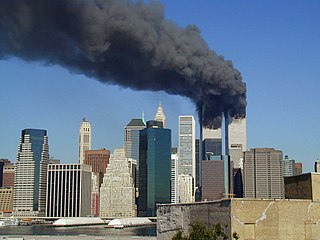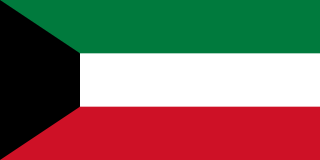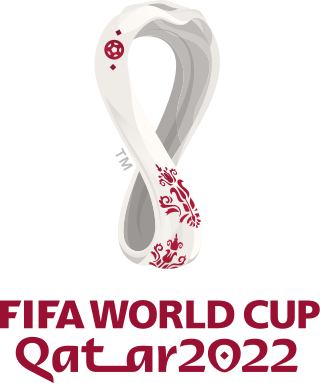Related Research Articles

Al-Qaeda is a Sunni pan-Islamist militant organization led by Salafi jihadists who self-identify as a vanguard spearheading a global Islamist revolution to unite the Muslim world under a supra-national Islamic state known as the Caliphate. Its members are mostly composed of Arabs, but also include other peoples. Al-Qaeda has mounted attacks on civilian and military targets in various countries, including the 1998 United States embassy bombings and the September 11 attacks; it has been designated as a terrorist group by the United Nations Security Council, the North Atlantic Treaty Organization (NATO), the European Union, and various countries around the world.

Osama bin Mohammed bin Awad bin Laden was a Saudi-born militant who was the founder of the pan-Islamic militant organization al-Qaeda. The group is designated as a terrorist group by the United Nations Security Council, the North Atlantic Treaty Organization (NATO), the European Union, and various other countries. Under bin Laden, al-Qaeda was responsible for the September 11 attacks in the United States and many other mass-casualty attacks worldwide.
Sunni Islam is the largest branch of Islam, followed by 85–90% of the world's Muslims. Its name comes from the word Sunnah, referring to the tradition of Muhammad. The differences between Sunni and Shia Muslims arose from a disagreement over the succession to Muhammad and subsequently acquired broader political significance, as well as theological and juridical dimensions. According to Sunni traditions, Muhammad left no successor and the participants of the Saqifah event appointed Abu Bakr as the next-in-line. This contrasts with the Shia view, which holds that Muhammad appointed his son-in-law and cousin Ali ibn Abi Talib as his successor.

Alfredo James Pacino is an American actor. Considered one of the greatest and most influential actors of the 20th century, Pacino has received numerous accolades: including an Academy Award, two Tony Awards, and two Primetime Emmy Awards, making him one of the few performers to have achieved the Triple Crown of Acting. He has also been honored with the Cecil B. DeMille Award in 2001, the AFI Life Achievement Award in 2007, the National Medal of Arts in 2011, and the Kennedy Center Honors in 2016.

Riyadh, formerly known as Hajr al-Yamamah, is the capital and largest city of Saudi Arabia. It is also the capital of the Riyadh Province and the centre of the Riyadh Governorate.

Muscat is the capital and most populated city in Oman. It is the seat of the Governorate of Muscat. According to the National Centre for Statistics and Information (NCSI), the total population of Muscat Governorate was 1.72 million as of September 2022. The metropolitan area spans approximately 3,500 km2 (1,400 sq mi) and includes six provinces called wilayats, making it the largest city in the Arabian Peninsula by area. Known since the early 1st century AD as an important trading port between the west and the east, Muscat was ruled by various indigenous tribes as well as foreign powers such as the Persians, the Portuguese Empire and the Ottoman Empire at various points in its history. A regional military power in the 18th century, Muscat's influence extended as far as East Africa and Zanzibar. As an important port-town in the Gulf of Oman, Muscat attracted foreign tradesmen and settlers such as the Persians, Balochs and Sindhis. Since the ascension of Qaboos bin Said as Sultan of Oman in 1970, Muscat has experienced rapid infrastructural development that has led to the growth of a vibrant economy and a multi-ethnic society. Muscat is termed as a Beta - Global City by the Globalization and World Cities Research Network.

The United Arab Emirates, or simply the Emirates, is a country in West Asia, in the Middle East. It is located at the eastern end of the Arabian Peninsula and shares borders with Oman and Saudi Arabia, while also having maritime borders in the Persian Gulf with Qatar and Iran. Abu Dhabi is the nation's capital, while Dubai, the most populous city, is an international hub.

Saudi Arabia, officially the Kingdom of Saudi Arabia (KSA), is a country in West Asia. It covers the bulk of the Arabian Peninsula, and has a land area of about 2150000 km2, making it the fifth-largest country in Asia, the second-largest in the Arab world, and the largest in West Asia and the Middle East. It is bordered by the Red Sea to the west; Jordan, Iraq, and Kuwait to the north; the Persian Gulf, Qatar and the United Arab Emirates to the east; Oman to the southeast; and Yemen to the south. Bahrain is an island country off its east coast. The Gulf of Aqaba in the northwest separates Saudi Arabia from Egypt and Israel. Saudi Arabia is the only country with a coastline along both the Red Sea and the Persian Gulf, and most of its terrain consists of arid desert, lowland, steppe, and mountains. Saudi Arabia's capital and largest city is Riyadh; the kingdom also is the location of Islam's two holiest cities of Mecca and Medina.

The AFC Champions League is an annual continental club football competition organised by the Asian Football Confederation, and contested by Asia's top-division football clubs. It is the most prestigious club competition in Asian football, played by the national league champions of their national associations.

Al-Ittihad Saudi Arabian Club, simply known as Al-Ittihad SFC, is a Saudi professional football club based in Jeddah founded in 1927. The club has spent its entire history in the top flight of football in Saudi Arabia, currently known as the Saudi Pro League.

The Saudi Pro League (SPL), known as the Roshn Saudi League (RSL), for sponsorship reasons, is the highest division of association football in the Saudi league system.

The September 11 attacks, commonly known as 9/11, were four coordinated Islamist suicide terrorist attacks carried out by al-Qaeda against the United States on Tuesday, September 11, 2001. That morning, 19 terrorists hijacked four commercial airliners scheduled to travel from the New England and Mid-Atlantic regions of the East Coast to California. The hijackers crashed the first two planes into the Twin Towers of the World Trade Center in New York City, two of the world's five-tallest buildings at the time, and aimed the next two flights toward targets in or near Washington, D.C. in an attack on the nation's capital. The third team succeeded in crashing into the Pentagon, the headquarters of the U.S. Department of Defense in Arlington County, Virginia, while the fourth plane crashed in rural Pennsylvania following a passenger revolt. The attacks killed nearly 3,000 people and instigated the multi-decade global war on terror.

Islam, transl. "Submission [to the will of God]") is an Abrahamic monotheistic religion centered on the Quran and the teachings of Muhammad. Adherents of Islam, called Muslims, number approximately 2 billion globally and are the world's second-largest religious population after Christians.

Kuwait, officially the State of Kuwait, is a country in the Middle East. It is situated in the northern edge of Eastern Arabia at the tip of the Persian Gulf, bordering Iraq to the north and Saudi Arabia to the south. Kuwait also shares maritime borders with Iran. Kuwait has a coastal length of approximately 500 km (311 mi). Most of the country's population reside in the urban agglomeration of the capital and largest city Kuwait City. As of 2022, Kuwait has a population of 4.45 million people of which 1.45 million are Kuwaiti citizens while the remaining 3.00 million are foreign nationals from over 100 countries.

The Islamic State (IS), also known as the Islamic State of Iraq and the Levant, Islamic State of Iraq and Syria, and by its Arabic acronym Da'ish or Daesh, is a transnational militant Islamist terrorist group and former unrecognized quasi-state that follows the Salafi jihadist branch of Sunni Islam. It was founded by Abu Musab al-Zarqawi in 1999 and gained global prominence in 2014, when it captured a large amount of Iraqi territory, and took advantage of the civil war in Syria to take control of chunks of territory in Eastern Syria. By the end of 2015, it held an area estimated to contain eight to twelve million people stretching from western Iraq to eastern Syria, where it enforced its interpretation of Islamic law, administered an annual budget of more than US$1 billion and had more than 30,000 fighters under its command. By 2019 it had lost the last of its Middle Eastern territories and returned to insurgency in the regions it once controlled, operating from remote hideouts, and continuing its propaganda efforts.

The 2022 FIFA World Cup was the 22nd FIFA World Cup, the world championship for national football teams organized by FIFA. It took place in Qatar from 20 November to 18 December 2022, after the country was awarded the hosting rights in 2010. It was the first World Cup to be held in the Arab world and Muslim world, and the second held entirely in Asia after the 2002 tournament in South Korea and Japan.

Alfred Matthew "Weird Al" Yankovic is an American musician best known for creating comedy songs that make light of pop culture and often parody specific songs by contemporary musicians. He also performs original songs that are style pastiches of the work of other acts, as well as polka medleys of several popular songs, most of which feature his trademark accordion.

The Kaaba, also spelled Ka'ba, Ka'bah or Kabah, sometimes referred to as al-Ka'ba al-Musharrafa, is a stone building at the center of Islam's most important mosque and holiest site, the Masjid al-Haram in Mecca, Saudi Arabia. It is considered by Muslims to be the Bayt Allah and is the qibla for Muslims around the world. The current structure was built after the original building was damaged by fire during the siege of Mecca by Umayyads in 683.

On 26 March 2015, Saudi Arabia, leading a coalition of nine countries from West Asia and North Africa, launched an intervention in Yemen following a request from Yemeni president Abdrabbuh Mansur Hadi for military support after his forces were ousted from Sanaʽa by Houthi insurgents during the Yemeni Civil War. The conflict ignited between the government forces, the Houthi rebels and other armed groups after the draft constitution and power-sharing arrangements collapsed, despite progress in the political transition led by the United Nations at that time, leading to an escalation of violence in mid-2014. The Houthis and allied insurgents seized control of Sana’a and other parts of the country in September 2014 and in the following months. This prompted President Hadi to ask Saudi Arabia to intervene against the Iranian-backed Houthis.
Al Jazeera is a Qatari state-owned Arabic-language international news television network. It is based in Doha and operated by the Al Jazeera Media Network.
References
| Part of a series on Islam Sufism |
|---|
 |
| Part of a series on Sunni Islam |
|---|
